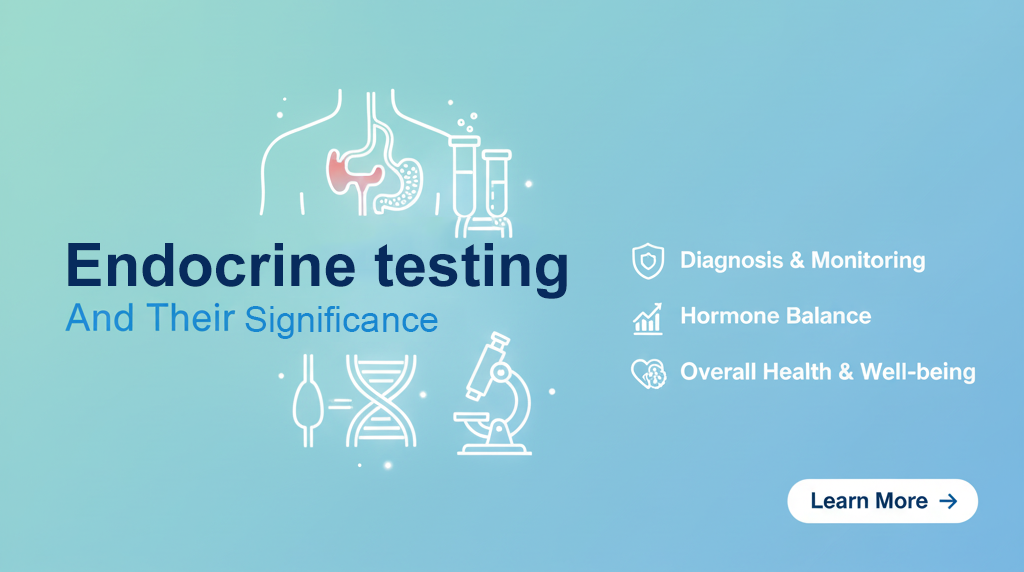Medic Saigon Clinic in Da Nang: A Trusted Endocrine Testing Center for Expatriates Residing and Working in Vietnam
Located in the center of Da Nang city, Medic Saigon Diagnostic Clinic stands as one of the foremost reputable private healthcare facilities, specializing in providing laboratory testing, diagnosis, and routine health check-up services for both Vietnamese nationals and expatriates. With nearly 15 years of experience in clinical laboratory science and endocrine biochemistry, the clinic is equipped with modern, automated testing systems that meet medical standards, operated by a team of highly-trained physicians and technicians who are always prepared to assist international clients.
One of the prominent services, trusted by many expatriate clients at Medic Saigon, is Endocrine Testing (hormone tests). This service helps evaluate the function of the body’s endocrine system, enabling the early detection of hormonal disorders, metabolic imbalances, or pathologies related to the thyroid, adrenal glands, reproduction, and growth.
A Trusted Endocrine Testing Center for Expatriates Residing and Working in Vietnam
The Endocrine System and the Role of Hormones in the Body
The endocrine system plays a regulatory role in nearly all of the body’s vital functions by secreting hormones—specialized chemical messengers released directly into the bloodstream.
These hormones influence various organs, including the brain, heart, liver, kidneys, muscles, skin, and reproductive organs.
When hormone levels become dysregulated or imbalanced, the body may experience numerous issues, such as:
- Sleep disorders and chronic fatigue.
- Unexplained weight gain or loss.
- Hair loss, dry skin, or excessive sweating.
- Menstrual irregularities and reduced fertility.
- Decreased libido and emotional changes.
- Blood glucose (sugar) or blood pressure dysregulation.
Endocrine testing serves as a vital tool for assessing the function of the endocrine glands, enabling the early detection of abnormalities to ensure timely treatment and intervention.
Categories of Endocrine Tests and Their Significance

Categories of Endocrine Tests and Their Significance
The Pituitary Gland
The pituitary gland is regarded as the “master control center” of the endocrine system, regulating the activity of most other glands in the body.
Common tests include:
- TSH (Thyroid Stimulating Hormone): A hormone that stimulates the thyroid gland. Levels are elevated in hypothyroidism and decreased in hyperthyroidism.
- GH (Growth Hormone): Regulates growth and metabolism. A deficiency can cause stunted growth in children, while an excess can lead to acromegaly (enlargement of extremities).
- ACTH (Adrenocorticotropic Hormone): Stimulates the adrenal glands to secrete cortisol. Levels are elevated in Cushing’s syndrome and decreased in adrenal insufficiency.
- Prolactin: Elevated levels may indicate a pituitary tumor and can cause abnormal milk secretion (galactorrhea), menstrual irregularities, or decreased libido.
- FSH (Follicle-Stimulating Hormone) and LH (Luteinizing Hormone): Control reproductive function in both males and females. Abnormal levels can lead to infertility, or precocious or delayed puberty.
The Thyroid Gland
The thyroid gland controls energy metabolism, heart rate, body weight, and body temperature.
Key tests include:
- FT3 (Free T3) and FT4 (Free T4): These represent the active forms of thyroid hormones. Levels are elevated in hyperthyroidism and decreased in hypothyroidism.
- TSH (Thyroid Stimulating Hormone): Used for a comprehensive assessment of the pituitary-thyroid axis.
- Anti-TPO (Thyroperoxidase Antibodies) and Anti-Tg (Thyroglobulin Antibodies): Autoimmune antibodies that aid in the diagnosis of conditions such as Hashimoto’s disease and Graves’ disease.
- Thyroglobulin (Tg): Used for monitoring patients following thyroidectomy (thyroid removal surgery) performed due to cancer or thyroid tumors.
- Calcitonin: Assesses blood calcium regulation and is a key marker for medullary thyroid pathology (such as medullary thyroid carcinoma).
The Adrenal Glands
The adrenal glands are responsible for regulating the body’s stress response, blood pressure, and energy metabolism.
Commonly performed tests include:
- Cortisol: The primary stress hormone; levels are elevated in Cushing’s syndrome and decreased in adrenal insufficiency (Addison’s disease).
- Aldosterone & Renin: Used to evaluate the causes of hypertension (high blood pressure) and electrolyte imbalances.
- DHEA-S (Dehydroepiandrosterone sulfate): A weak androgen; used to assess hyperandrogenism (excess androgen) in females, which can manifest as hirsutism (excess body hair), acne, and PCOS (Polycystic Ovary Syndrome).
- Catecholamines, Metanephrines, and VMA (Vanillylmandelic Acid): Used to screen for tumors of the adrenal medulla, specifically pheochromocytoma.
The Gonads (Ovaries and Testes)
These are directly related to reproductive function, sexual capacity, and gender-specific endocrine functions.
In Females:
- Estrogen (E2): Reflects ovarian activity and the menstrual cycle.
- Progesterone: Levels increase post-ovulation (after ovulation) and are essential for maintaining pregnancy.
- AMH (Anti-Müllerian Hormone): Assesses ovarian reserve and provides a prognosis for reproductive potential (fertility).
- Testosterone: Elevated levels may indicate Polycystic Ovary Syndrome (PCOS) or androgen-secreting tumors.
In Males:
- Testosterone (Total and Free): Reflects testicular function and libido (sexual drive).
- FSH, LH: Assess spermatogenesis (sperm production) and pituitary function.
- Prolactin: Elevated levels can cause decreased libido and erectile dysfunction.
The Pancreas
The pancreas functions as both an endocrine and exocrine gland and is directly involved in blood glucose (sugar) regulation.
- Blood Glucose and HbA1c: Used to diagnose and monitor diabetes mellitus.
- Insulin and C-peptide: Help determine the cause of blood glucose disorders and differentiate between Type 1 and Type 2 diabetes.
The Parathyroid Glands
These glands regulate calcium and phosphorus levels in the blood, which directly impacts bone and muscle health.
- PTH (Parathyroid Hormone): Levels are elevated in hyperparathyroidism; decreased levels (seen in hypoparathyroidism) are a common cause of hypocalcemia (low blood calcium).
- Blood Calcium and Phosphorus: Assessed concurrently with PTH to identify mineral metabolism disorders.
- Vitamin D: Vitamin D deficiency reduces calcium absorption, thereby increasing the risk of osteoporosis.
The Significance and Benefits of Endocrine Testing
- Early Detection of Hormonal Disorders: Facilitates the prevention of serious complications arising from endocrine hyperfunction (excess) or hypofunction (deficiency).
- Aiding Accurate Diagnosis: Supports the diagnosis of conditions such as infertility, menstrual irregularities, endocrine hypertension, diabetes mellitus, and chronic fatigue.
- Treatment Monitoring: Essential for managing thyroid diseases, diabetes, and other chronic endocrine pathologies.
- Comprehensive Health Assessment: Provides a holistic evaluation of reproductive health, growth, and metabolic functions.
- Beneficial for Expatriates: Particularly useful for expatriates adapting to the climate, nutrition, and lifestyle habits in Vietnam—all of which are factors that can impact the endocrine system and metabolic processes.
Why Choose Endocrine Testing at Medic Saigon Da Nang Clinic?
- Modern Facilities and International-Standard Equipment.
- Highly Specialized Team with bilingual (Vietnamese – English) communication, keenly aware of the needs of international clients.
- Accurate and Rapid Results, delivered via email or hard copy.
- Absolute Confidentiality of personal information and medical records.
- In-depth Post-Test Consultation, providing guidance on appropriate nutritional and lifestyle adjustments.
- Friendly, Professional Service with flexible scheduling support (including after-hours and weekend appointments).
Who Should Undergo Endocrine Testing?
- Individuals experiencing fatigue, unexplained weight loss, or weight gain.
- Individuals with menstrual irregularities, infertility, or decreased libido.
- Individuals presenting with symptoms such as sleep disorders, excessive sweating, or hair loss.
- Individuals with suspected pathologies of the thyroid, adrenal, or pituitary glands.
- Expatriates residing long-term in Vietnam who wish to undergo routine health checks or comprehensive hormone screening.
Endocrine testing is a crucial step in understanding the “internal language” of your body, thereby facilitating early detection, appropriate treatment, and more comprehensive healthcare. Medic Saigon Diagnostic Clinic in Da Nang is committed to partnering with you—especially our international clients—in monitoring endocrine health and maintaining an optimal state of balance, energy, and well-being.
Medic Saigon Diagnostic Clinic Branch
- Address: 97 Hai Phong Street, Hai Chau District, Da Nang City
- Hotline/Zalo: +84 914 496 516
- Website: https://phongkhammedic.com




